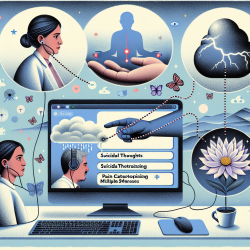Voice assessments play a crucial role in evaluating vocal structure and function, identifying impairments, and determining the best interventions for individuals with voice or laryngeal disorders. At TinyEYE, we understand the importance of thorough and accurate assessments conducted by qualified professionals. This blog will provide an easy-to-read overview of voice assessments, including the process, expected outcomes, and clinical indications.
What is a Voice Assessment?
A voice assessment is a detailed evaluation of an individual's vocal structure and function. It identifies strengths and weaknesses, assesses activity and participation limitations, and considers contextual barriers and facilitators. This comprehensive approach ensures that all aspects of the individual's voice and communication abilities are thoroughly examined.
Who Conducts Voice Assessments?
Voice assessments are conducted by appropriately credentialed and trained speech-language pathologists (SLPs). These professionals are skilled in evaluating and diagnosing voice disorders and laryngeal disorders affecting respiration and communication performance.
Expected Outcomes of a Voice Assessment
According to the World Health Organization (WHO) framework, a voice assessment aims to:
- Identify underlying strengths and deficits related to a voice or laryngeal disorder.
- Assess the effects of the disorder on the individual's everyday communication and participation.
- Determine contextual factors that may act as barriers or facilitators to successful communication and participation.
Outcomes of a voice assessment may include:
- Diagnosis of a voice or laryngeal disorder.
- Description of perceptual phonatory characteristics.
- Measurement of aspects of vocal function.
- Examination of phonatory behavior.
- Identification of a communication difference that may co-occur with the disorder.
- Prognosis for change.
- Recommendations for intervention and support.
- Referral for other assessments or services.
Clinical Indications for Voice Assessment
Voice assessments are provided to individuals of all ages as needed, requested, or mandated. They are also conducted when evidence suggests that an individual has a voice or laryngeal disorder affecting body structure/function and/or activities/participation. Assessment may be prompted by:
- Referral.
- The individual's medical status.
- Failing a speech screening sensitive to cultural and linguistic diversity.
The Clinical Process
All patients with voice disorders are examined by a physician, preferably in a discipline appropriate to the presenting complaint. The physician's examination may occur before or after the voice evaluation by the SLP.
Comprehensive assessments are sensitive to cultural and linguistic diversity and address the components within the WHO's International Classification of Functioning, Disability, and Health (2001) framework. These components include body structures/functions, activities/participation, and contextual factors.
Assessment methods may be static (describing functioning within relevant domains) or dynamic (identifying potentially successful intervention and support procedures) and include:
- Review of auditory, visual, motor, and cognitive status.
- Relevant case history, including vocal use history, medical status, education, vocation, and cultural and linguistic backgrounds.
- Standardized and nonstandardized methods:
- Perceptual aspects of vocal production/behavior.
- Acoustic parameters of vocal production/behavior.
- Physiological aspects of phonatory behavior.
- Patient's ability to modify vocal behavior.
- Emotional/psychological status.
- Medical history and associated conditions.
- Observation or review of articulation, fluency, and language.
- Functional consequences of the voice disorder.
- Use of perceptual and/or instrumental measures, including:
- Perceptual ratings.
- Acoustic analysis.
- Aerodynamic measures.
- Electroglottography.
- Imaging techniques such as endoscopy and stroboscopy (these procedures may be conducted and interpreted in collaboration with other professionals).
- Selection of standardized measures for voice assessment with consideration for documented ecological validity.
- Follow-up services to monitor voice status and ensure appropriate intervention and support for individuals with identified voice disorders.
For more information, please follow this link.










